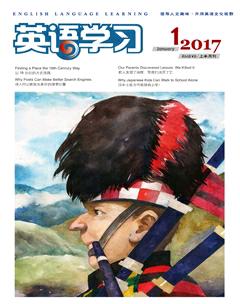诗人何以能做出更好的搜索引擎
By+Nathaniel+Popper
“詩歌能帮我们制造出更好的搜索引擎。”这是肯硕公司创始人之一丹尼尔·纳德勒(Daniel Nadler)的高见。早在哈佛读书时,这位科技奇才就曾拜在普利策得奖诗人乔丽·格雷厄姆门下……他说,每个清晨和周末都是留给诗歌创作的,不查邮件、不接电话甚至不照镜子,因为就想尝试一种最质朴的写作方式,即:驱除一切干扰,拥抱本我,吐露心声。 Daniel Nadler spends most of his waking hours running the technology start-up Kensho, which has become a darling of the financial industry, attracting big investments from Goldman Sachs and venture capitalists.1
But in the mornings and on weekends, Mr. Nadler, 33, writes poetry—an art he studied while at Harvard, where he was a student of the Pulitzer Prize2-winning poet Jorie Graham. Mr. Nadlers first collection, “Lacunae: 100 Imagined Ancient Love Poems,” has been published by Farrar Straus and Giroux.3
Mr. Nadler may work with technology, but his book imagines a world before computers and telephones. The unnamed narrators of these love poems live in an unidentified place in a distant mythic past.4 Jonathan Galassi, Mr. Nadlers editor at Farrar Straus, said he was drawn to the pared-down, direct nature of the work: “Not many poets today are bold enough to be this simple.”5
Mr. Nadler has developed some rather austere practices for separating his poetry from his job as an entrepreneur.6 When he is writing he doesnt check his email, speak or even look in a mirror.
But he also says that his work at Kensho—on what is essentially a search engine for economic events and data—is deeply informed by his experience as a poet, and vice versa.7
We talked to Mr. Nadler about his habits, his day job and why poets can make better search engines. Below are edited excerpts8 from the conversation.
* When do you write your poetry?
I write in the morning.
I make a habit of not looking at email and try to make it so I have a period of time in which whatever is going on in the world hasnt arrived at the threshold of my consciousness yet.9
* I heard that you also avoid looking in mirrors.
I never look in a mirror until I am finished writing for the day. My own reflection in a mirror reminds me that I am an organism10 situated in time, one that once was not here, one that will at some point not be here.
* Can you explain the concept behind this volume11 of poetry? In my mind, I created this idea of ancient poems that in reality have never been written. My project is the same project that I believe Pablo Neruda was pursuing, which was a direct encounter with nature, unburdened by the history of allusion and the history of symbolism, and the history of footnotes.12
* What is the world these characters live in?
A world without technology—a world without the internet—in a world without complex political and economic structures. In such a time, the most conspicuous thing on the horizon is love.13
The exploration of that world was the path through which to get back to the basic elemental truths about love and human relationships.14
* It seems a bit odd15 for a technologist to be writing about a time before technology, no?
Artificial intelligence and machine intelligence are about decreasing the length of human perception.16 Google autocomplete17 is an attempt to shorten the time and path between thought and a response—to decrease the time and path between seeing something and categorizing it or identifying it and moving on.
To me what poetry in particular is so good at is defamiliarization.18 Increasing the length of perception. Allowing grown adults to return to the childlike state in which routine experiences, or ordinary objects seem totally strange or foreign.
To me that is the role that art in general and poetry specifically must play in the 21st century. As a counterweight to the many things pushing to decrease the length of perception.19
* Why choose poetry as your art form?
My generation has grown up through video games and immersive20 worlds. In a video game your character can see a rock and then just sort of walk around the rock. Thats a very different modality21 than a movie, which is a totally directed experience.
Poetry is the most directly analogous high art form to environments like video games and virtual reality.22 Poetry is entirely about regulating the pace of your own emotional transportation, and it is the one that is going to be the most native to millennials who have grown up with that idea.23
* Does your poetry complement your day job or distract from it? 24
They are wonderfully synergistic, which is why I never feel myself needing to divide my time.25
Poetry teaches you how to build a better search engine because it teaches you how to reflect on the needed balance between expectation, utility and serendipity.26
If a search engine only provides exactly what you are looking for, then it is only as smart or as dumb27 as you are. We all know from using search engines that a pleasure of life is serendipitous discovery. Its one of the reasons we like using Wikipedia28. As a design principle, thats a way to build a better search engine.
1. Kensho: 肯硕,来自日文,意为佛家的“见性”。肯硕是一家金融分析公司,由丹尼尔·纳德勒与程序员彼得·克鲁斯卡尔联合创立。该公司正在研发一种针对专业投资者的大规模数据处理分析平台,被认为是能撼动金融分析行业、以人工智能取代华尔街顶级金融工程师的产品;darling: n. 宠儿;Goldman Sachs: 高盛集团,一家国际领先的投资银行和证券公司,总部位于纽约曼哈顿;venture capitalist: 风险投资家。
2. Pulitzer Prize: 普利策奖,美国一年一度颁发给新闻、文学、戏剧和音乐方面优秀作品之奖,由Joseph Pulitzer设立,于1917年首次授奖。
3. lacuna: 空隙,空白,复数形式为lacunas或lacunae;Farrar Straus and Giroux: 法劳斯特劳斯和吉罗出版社(FSG)。
4. narrator: 叙述者;mythic: 神话般的。
5. 乔纳森·加拉西,纳德勒先生在FSG的编辑,表示他被这些诗作的简约和直接所吸引:“现在的诗人,没几个敢如此朴素地表达自己。”pared-down: 简化的,缩减的;bold: 大胆的。
6. austere: 严厉的,一丝不苟的;entrepreneur: 企业家。
7. 但他也表示,他在肯硕这家经济事和数据搜索引擎公司的工作也深受写诗的影响,反之亦然。inform: 影响(态度、风格等);vice versa: 反之亦然。
8. excerpt: 节选。
9. 我养成了(写诗时)不查邮件的习惯,目的就是想尝试一下使自己处于这种状态,即无论外界发生什么都无法进入我的意识。threshold: 門口,门槛。
10. organism: 生物,有机体。
11. volume: (书的)册,卷。
12. 我相信我的目标也曾是智利诗人聂鲁达所追求的,即解除由来已久的用典、象征主义与脚注的负荷,彻底拥抱自然。Pablo Neruda: 巴勃罗·聂鲁达(1904—1973),智利诗人、外交官,代表作有《二十首情诗和一首绝望的歌》、《诗歌总集》等,获1971年诺贝尔文学奖;unburden: 卸去负担;allusion:引用典故;symbolism: 象征主义;footnote: 脚注,补充说明。
13. conspicuous: 显眼的,显著的;horizon: 地平线。
14. 借由对这个领域的探索,我们才能找到一条途径,重新寻回有关爱和人际关系的最基本固有的真相。elemental: 基本的,固有的。
15. odd: 古怪的。
16. artificial intelligence: 人工智能;perception: 感知,知觉。
17. Google autocomplete: 谷歌搜索的自动完成功能,可以根据用户输入的内容,揣测用户的搜索意愿,不仅向用户提出建议,还自动帮用户补全搜索关键字。
18. 对我来说,诗歌尤其擅长的就是陌生化。defamiliarization: 陌生化。
19. 但对我而言,这是21世纪广义的艺术,特别是诗歌必须承担的角色,它可以对很多试图减少感知时长的东西起到一个平衡作用。counterweight: 抗衡力,平衡物。
20. immersive: 沉浸式虚拟现实的。
21. modality: 感觉模式。
22. 诗歌对于营造环境来说,是一种最贴近电子游戏和虚拟现实的高级艺术形式。analogous: 类似的;virtual reality:虚拟现实。
23. regulate: 调节,控制;native: 生来就有的;the millennials: 千禧一代,泛指1983—2000年出生(有时也包括1980—1982年)的一代人,差不多伴随着电脑和互联网的形成与发展一同成长。
24. complement: 补充,补足;distract: 转移,分心。
25. 他们相辅相成天衣无缝,因此我从不觉得自己需要在时间上拉锯。synergistic:具有协同作用的。
26. utility: 实用,效用;serendipity: 意外的发现,好运气,出自英国作家霍勒斯·沃波尔(Horace Walpole)所著童话故事《锡兰国三王子》(The Three Princes of Serendip),书中主人公具有随处发现珍宝的本领。后文的serendipitous是其形容词形式。
27. dumb: 笨的,傻的。
28. Wikipedia: 维基百科,一部基于互联网、内容开放的全球多语言百科全书,也是目前世界上最大的百科全书。

